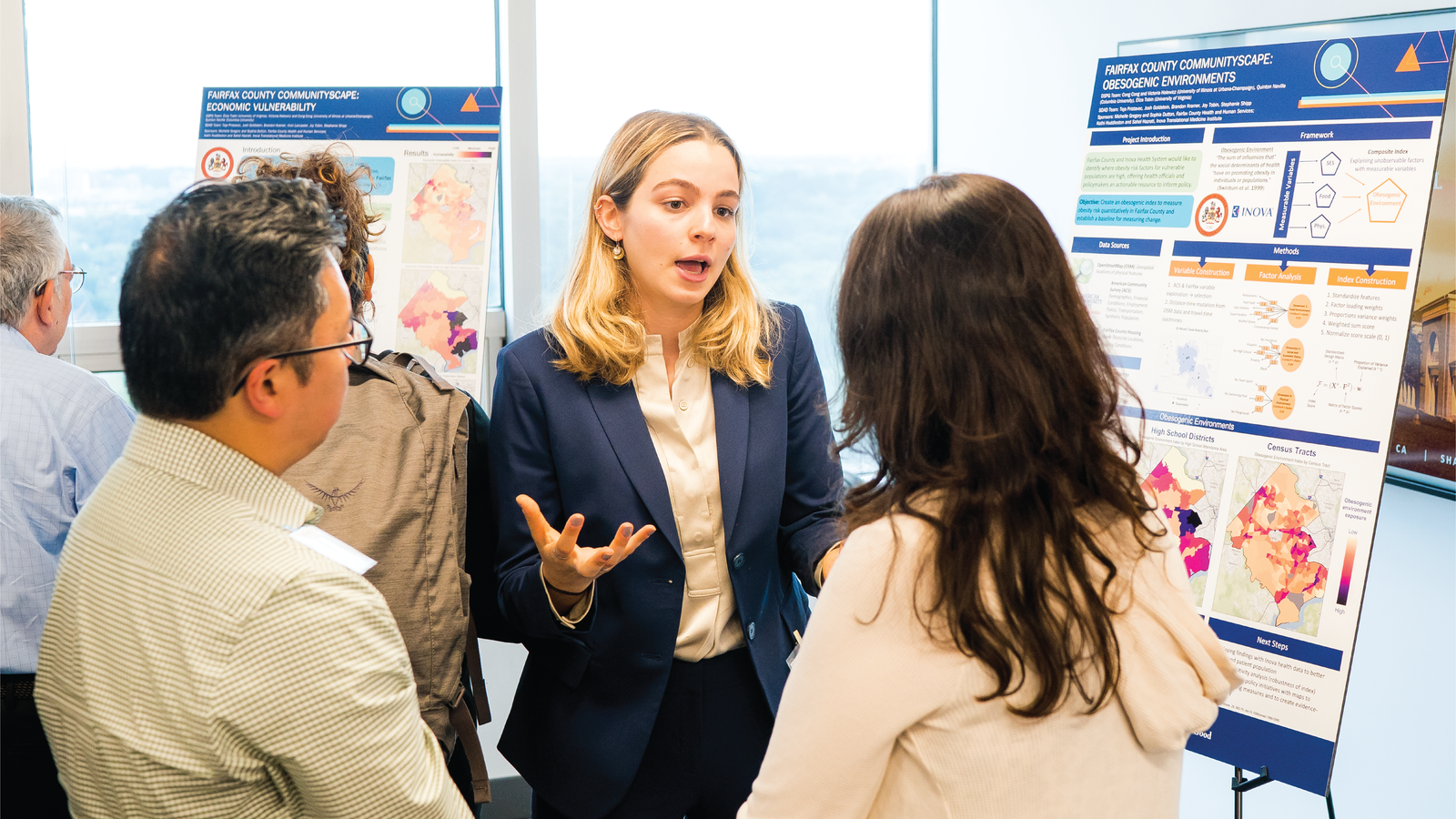
Biocomplexity Institute Helps Launch First All-Virtual Data Science for Public Good Young Scholars Program
Over the last five summers, students from across the country have come together at the Biocomplexity Institute’s Arlington, Va. location for the Data Science for the Public Good (DSPG) Young Scholars program – an 11-week immersive research program through which students gain world-class, hands-on professional experience combining data science and public service. This year, as the world continues to evolve due to the COVID-19 pandemic, the program has followed suit, adopting an entirely virtual format for the first time.
Earlier this year, the Institute was awarded a nearly $1 million grant from the U.S. Department of Agriculture (USDA) to expand the DSPG program beyond the Commonwealth of Virginia. The grant has funded development of a three-state Coordination Innovation Network that is focused on creating DSPG programs at land-grant universities in Iowa, Oregon, and Virginia. This funding has enabled the Institute to expand the Young Scholars program this year to include faculty from its partners Virginia Tech, Virginia State, Iowa State, and Oregon State Universities.
The program, which launched May 26 and runs through August 7, brings more than 60 undergraduate and graduate students together with postdoctoral fellows, faculty, government professionals, and community leaders to tackle over 30 research projects throughout the summer. Projects combine statistical and computational sciences with the social sciences to determine how data can be leveraged to inform public policy and improve quality of life.
"This year’s program looks drastically different from year’s past as we have pivoted to a completely virtual program and integrated activities across five universities, yet the students are still very eager to learn and make material contributions to research that will have a positive and lasting impact in our communities," said Gizem Korkmaz, research associate professor in the Institute’s Social and Decision Analytics Division and DSPG program co-lead. "A career in data science is undoubtedly full of challenges and problems to solve, and this year, the inability to collaborate in-person is one of those. Our scholars are meeting that challenge with resilience and tenacity, which will undoubtedly serve them well throughout their careers."
The DSPG Young Scholars program begins with intense training on computational and data science skills and operating procedures, communication, visualization, ethics, and responsible conduct of research. Students then form small interdisciplinary project teams and work collaboratively on two research projects throughout the summer. They meet with their teams, attend professional development workshops, take excursions to nearby science and technology facilities, and are assigned a post-doctoral and senior mentor for research and career guidance.
This summer, DSPG Young Scholars are logging in with fellow students for virtual training and development sessions led by faculty from the five partnering universities. Research teams are meeting online for work sessions and with their project stakeholders throughout the summer. And, professional development and career coaching sessions are also taking place online.
"There are some advantages to the virtual format," said Aaron Schroeder, research associate professor in the Institute’s Social and Decision Analytics Division and DSPG program co-lead. "Students have the benefit of learning from faculty from all five DSPG partner universities, and the opportunity to train alongside and exchange ideas with students from various disciplines, academic levels, and universities across the country. This has clearly expanded the access and reach of our vibrant program."
The DSPG Young Scholars work with their teams on a variety of research projects ranging from the public health domain to human services, housing, and innovation. Many of the project stakeholders include local, state, and federal agencies such as the Charlottesville Fire Department, County of Albermarle Department of Fire Rescue, National Endowment for the Humanities, National Science Foundation, and U.S. Army Research Institute for the Behavioral and Social Sciences. This year’s research topic areas include:
- Understanding the impact of COVID-19 on the delivery of emergency medical services,
- Factors of incarceration and recidivism in rural Virginia,
- Measuring the impact of local food network initiatives in rural Oregon,
- Exploring career pathways of Army veterans,
- Using machine learning to detect pharmaceutical sector innovation through news articles; and,
- Extracting insights from historical textual data about American soldiers in World War II, among others.
"Since its inception, the DSPG Young Scholars program has conducted nearly 60 research projects, all with the purpose of improving our community on some level," said Sallie Ann Keller, director of the Institute’s Social and Decision Analytics division. "The Institute is proud to lead this kind of work, to help shape the next generation of data scientists, and make a positive impact by utilizing data science for the public good."
Each year, the DSPG Young Scholars program culminates with the DSPG Annual Symposium, an event to celebrate the scholars and allow them to present their research publicly. The event draws hundreds of people including students, faculty, project stakeholders, nonprofit organizations, the academic sector, and the public. This year’s Symposium is planned for Friday, Aug. 7, and while the format is still undetermined, it will feature keynote speaker Kenneth Prewitt, Carnegie Professor of Social Affairs at Columbia University and former director of the United States Census Bureau.
For more information about the DSPG Young Scholars program and the DSPG Annual Symposium, visit https://biocomplexity.virginia.edu/social-decision-analytics/dspg-program.